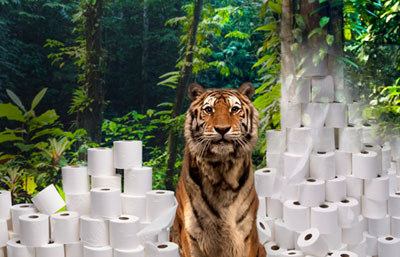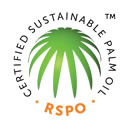The tiger (Panthera tigris) is the world’s most favorite animal according to a survey carried out by Animal Planet. This poll of more than 50,000 people in 73 countries chose the tiger, the world’s largest and most threatened with extinction of the big cats. When asked to explain the overwhelming appeal of the tiger, Dr. Candy d’Sa, an animal behaviorist, said: “We can relate to the tiger, as it is fierce and commanding o the outside, but noble and discerning on the inside.”
The tiger’s win was greeted with hope by conservationists because if people are choosing the tiger as their favorite animal, they surely will do what is needed to ensure their survival. But the tiger has vanished from 93% of their historic range. And down from 100,000 wild tigers 100 years ago to fewer than 3,200 remain in the wild today. Will we do what is needed to endure the tiger’s survival? Here are 3 simple tings you can do to help save wild tigers.
1) Tissue Products are Pushing Sumatran Tigers to Local Extinction

The toilet paper on your grocery store shelves may have a direct impact on the 400 Sumatran tigers left in the wild. Image courtesy of WWF. Please buy only FSC- certified and recycled fiber paper products.
The green dense rain forests on the Indonesian island of Sumatra are the only place in the entire world where elephants, tigers, rhinos and orangutans live together. But, since 1985, Sumatra has lost over half of its forest to the pulp and paper and palm oil industries. With only an estimated 400 Sumatran tigers left in the wild, we must all stand together to protect the last remaining habitat for theses tigers.
The World Wildlife Federation, (WWF) hunted down the connection between the United States toilet paper and tissue products and the destruction of tropical forests in
Sumatra. What WWF found out is that the end products from the deforestation of the Sumatran forests are showing up on the United States supermarket shelves and in restaurants, hotels, schools and homes.
What can you do?
Consumers are more alert and empowered than ever before to make responsible buying decision.
- As the easiest way to avoid these impacts, look for tissue products that are Forest Stewardship Council (FSC)-certified or 100%recycled.
- Ask your grocer, retailers, schools, hotels and restaurants if they know the forest source of the tissue and paper products they carry.
- Ask them to carry more FSC-certified and recycled paper products.
2) Palm Oil and Tiger Habitat Destruction
Palm oil represents about 30% of the total vegetable oil in the market today and is used in many food products, cosmetics, bath products and now increasingly in bio-fuels. Due to rising global demand for vegetable oils, and the fact that yield per acre of palm oil is between 5-10 times higher than those of other sources of vegetable oil, palm oil production has increased rapidly over the past 20 years.
Today, more than 80% of palm oil production occurs in Malaysia and on the Indonesian island of Sumatra, home of the Malayan and Sumatran tigers. These two regions contain globally important landscapes for tigers. Because palm oil plantations typically have little understory vegetation they have limited value to biodiversity generally, and tigers specifically. Consequently, palm oil plantations are poor habitat for tigers.
What can you do?
You can help tigers by only buying products that use sustainable palm oil. The Roundtable on Sustainable Palm Oil (RSPO) certifies palm oil producers that follow  guidelines aimed at minimizing their impact on tigers, orangutans, and the environment.
guidelines aimed at minimizing their impact on tigers, orangutans, and the environment.
As a consumer, your purchasing power can encourage companies to meet their societal and environmental responsibility. You can support these efforts by making sure you only purchase products that contain certified sustainable palm oil, as identified by the RSPO Trademark.
Our friends at the Cincinnati Zoo have a great resource for you to use. Check out their palm oil video and smart phone shopping guide app by pouncing here: Cincinnati Zoo sustainable shopper app
3) Care and Share What You Know About Helping Save Wild Tigers
This seems almost too easy but the truth is, many people are not aware of the wild tiger crisis.
What can you do?
Whenever you get a chance to talk tigers, don’t shy away, speak up and ask others to buy FSC certified paper products and RSPO certified sustainable palm oil. And for a more in depth conversation with your family and friends you could share your knowledge about the primary threats facing wild tigers today.
They are:
- Wild tigers are being hunted to meet the demands of the illegal wildlife trade market. Tiger parts are consumed for traditional medicinal purposes across Asia, with a heavy demand in China. The international illegal trade in wildlife products is estimated to yield more than $6 billion a year.
- Not only are tigers hunted, but their wild prey, like deer and wild pigs, have been overhunted by people for both sale and for survival. A depleted prey base means that tigers will often attack livestock to feed themselves and their cubs, increasing human-tiger conflict.
- Because of the increasing human population, humans and tigers are living in close proximity in many places across their range. Wild tigers are often persecuted when villagers take retaliatory measures to protect their livestock.
- Tigers need intact habitat in order to survive but their habitat is increasingly under threat and being destroyed or fragmented from agricultural developments, like we discussed with the paper products and palm oil.
Don’t miss out on The Tiniest Tiger News :
Subscribe to our newsletter


I does my heart good to see people finally getting educated and involved in saving the wild tigers. I have dedicated my entire life to tiger education programs and we have touched thousands of people over the last 17 years, but I still wish there was a way to reach a broader spectrum of people. I know more people would care and participate if they only knew the extent to which the tigers are now threatened. Thank you for providing yet another venue for people to learn, care and participate. The tigers of the world, and I, thank you!!
Thank you for the continuing education on this subject! So much to learn. xoxox
Annie, I take the pledge with you. Thank you for sharing this information! You are a sweet, smart girl, and I want to help you as you help the tigers.
I didn’t know about toilet paper or palm oil. Great to know this!!! I’m going to use recycled TP from now on. I always see it on the shelves, but I don’t go for it for some reason. Will do!! Great tip, thanks!
Sometimes the little things we do can make a big difference. Thank you for caring about all cats big and small!
We didn’t know the connection between tigers and toilet paper. That’s really interesting. Thanks for pointing it out to us.
Thank you so much for reading and for caring about tigers too!